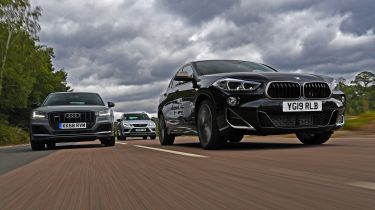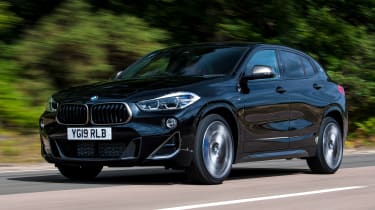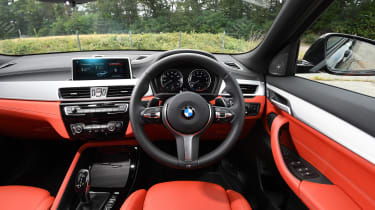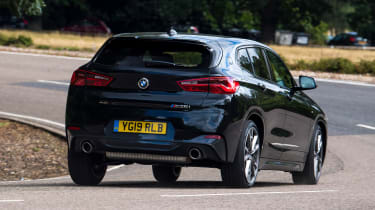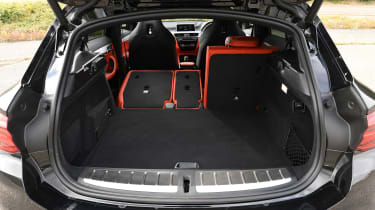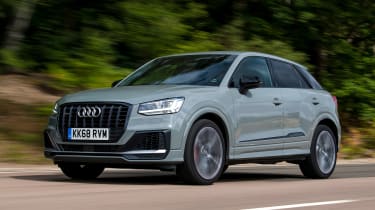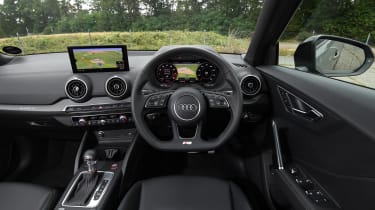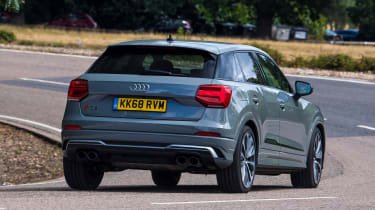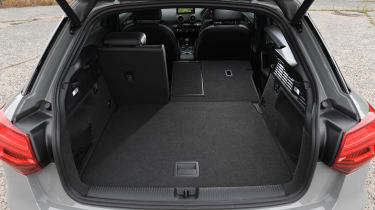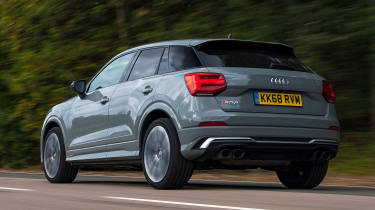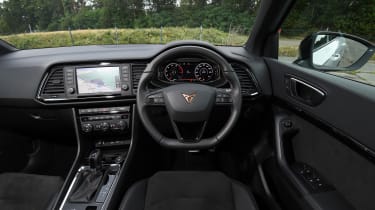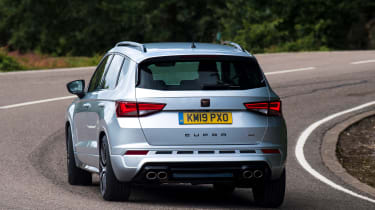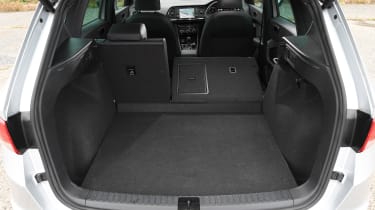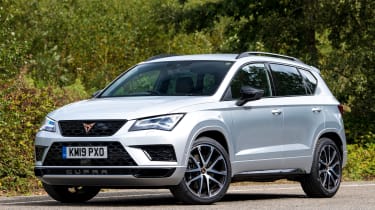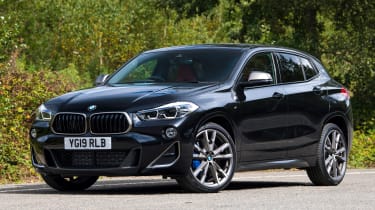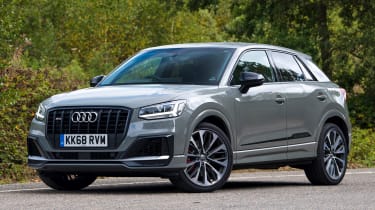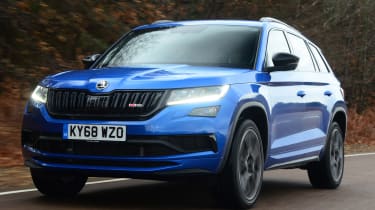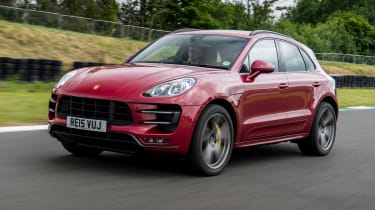BMW X2 M35i vs Audi SQ2 vs Cupra Ateca
The new BMW X2 M35i goes up against the Audi SQ2 and Cupra Ateca in this performance SUV showdown
With the popularity of SUVs showing no signs of waning, it was inevitable that some manufacturers would create a new type of performance car that caters to a new sub-section of buyers: the hot SUV.
The Porsche Cayenne is a good example of a fast SUV that’s been around for more than 15 years, but until now, most rapid models have been expensive. However, here we test three performance SUVs that are based on normal family models, which means they’re more affordable.
• Fastest SUVs in the world 2019
BMW’s latest performance SUV is the newest car here, and the X2 M35i follows a formula that was established by the likes of the Audi SQ2 and the Cupra Ateca: a powerful four-cylinder petrol engine, four-wheel drive and an auto gearbox.
With its focus on style and performance, the X2 lines up here against the similarly pitched SQ2, which copies the Cupra’s formula (not least because it uses many of the same parts). It’s both of these the X2 M35i will need to beat if it wants to be the best fast, affordable family SUV.
Compared with a conventional hot hatch these cars are compromised dynamically due to their higher ride heights, but then that’s offset by the fact that they’re more versatile. Either way, our winner will need to be quick and practical to score a victory.
BMW X2 M35i
| Model: | BMW X2 M35i |
| Price: | £44,235 |
| Engine: | 2.0-litre 4cyl petrol, 302bhp |
| 0-60mph: | 5.0 seconds |
| Test economy: | 34.2mpg/7.5mpl |
| CO2: | 157g/km |
| Annual road tax: | £465 |
The BMW X2 is based on the more practical X1, but is a sleeker, more stylish design that’s best suited to this performance treatment. In M35i form it’s the most expensive model in the range, and at £44,235, almost the most expensive car in this test.
Used - available now
Design & engineering
The X2 uses BMW’s UKL2 platform, which means some models in the range are front-wheel drive. This high-end performance variant gets xDrive four-wheel drive as standard, though, as well as an eight-speed automatic gearbox.
Under the bonnet is a four-cylinder engine, rather than the six-cylinder motor that you’d normally associate with the M35i badge. That puts it in line with its rivals here, because all feature turbocharged 2.0-litre units with around 300bhp. The X2’s output is slightly higher than its rivals’ 296bhp, at 302bhp.
BMW has tuned the suspension with performance in mind, and adaptive dampers aren’t fitted as standard here, as with the SQ2, although they are on the Cupra.
The M35i model also features an electronic limited-slip differential and beefier brakes, the former improving traction out of corners and the latter working to keep the BMW’s 1,610kg kerbweight – which is the heaviest here – in check.
The X2’s interior features leather seats and additional sporty trim, which is available in an eye-catching orange (as on our test car). It’s not as high in quality as we would expect given the M35i’s asking price, but the neat design and good materials mean it’s more upmarket than both its rivals. The cabin is more enclosed around the driver, too, which gives it a sportier feel.
Equipment is pretty generous. You get 20-inch alloy wheels, sat-nav, heated leather seats, LED lights and a powered tailgate all as standard, but the X2 isn’t as well equipped as the Cupra Ateca.
Driving
The BMW’s 2.0-litre engine is the most powerful here, with 302bhp and 450Nm of torque. Those figures are produced at 5,000rpm and 1,750rpm respectively, which is lower in the rev range than the 296bhp and 400Nm of torque in the Audi and Cupra. This gives the X2 a muscular feel, because you don’t have to use as many revs. Yet the BMW’s engine is also livelier at high revs, so it’s more engaging to use than the effective but dull motor shared by its rivals.
Despite the BMW’s higher kerbweight, the X2 M35i’s engine delivers strong performance in-gear. It was quicker than both rivals in third and fourth from 30-50mph, taking 2.2 and 3.5 seconds respectively. The BMW also took 3.9 seconds to go from 50-70mph in fifth, which was ahead of the SQ2 and Ateca’s 5.1 and 5.3-second times respectively.
However, it did fall behind slightly in our 0-60mph tests, taking 5.0 seconds, which was half a second behind the Audi and 0.3 seconds behind the Cupra. The X2’s extra weight and an eight-speed automatic gearbox that isn’t as quick to shift as the dual-clutch boxes used by its rivals, explains this result.
This extra mass also hampers the X2’s dynamics – without adaptive dampers, there is more body roll than in either rival in corners, and as the weight distribution shifts forward, the X2 tends to understeer. It’s similar to the Cupra in this way, but the BMW isn’t as responsive to inputs from the driver to tighten the car’s line. The Audi is the best in this regard, because it feels lower to the ground and more composed than its rivals in bends.
The X2’s steering is reasonably well weighted, but it’s not very precise and the much more accurate set-ups in the Cupra and Audi inspire confidence.
The most positive aspect of the BMW’s driving experience is the ride quality, which is acceptable on the M35i’s large 20-inch alloys. It deals with big potholes more fluidly than its rivals, which are both very stiff. Even the Cupra’s softest mode on its adaptive dampers feels stiffer than the X2’s set-up.
Practicality
The BMW is somewhere between the Cupra and the Audi when it comes to rear-seat space. There’s more leg and headroom than in the SQ2, but the Ateca is definitely the most spacious model here. The BMW’s leather seats are comfortable, but it’s a bit dark inside.
The BMW also has a much larger boot than the Audi – at 470 litres compared with 355 litres. The Ateca is larger still, with 485 litres, and that car also has a larger tailgate, so it’s easier to get big items like bikes or buggies in and out.
Ownership
In our 2019 Driver Power customer satisfaction survey BMW finished in a poor 25th place, which was quite a bit behind Audi in 16th. Because it’s such a new brand, Cupra didn’t feature in the results, although its parent firm SEAT placed in 14th.
AEB is fitted as standard, but you have to pay £790 for the Driver Pack in the X2 to get lane- keep assist and pedestrian detection. Even a reversing camera costs an extra £610 as part of the Vision Pack. It’s standard on the Cupra and £350 on the Audi.
Running costs
Our depreciation experts predict that the X2 M35i will hold on to 45.7 per cent of its value after three years or 36,000 miles, which is a loss of £24,484 in that time, so the final value will be £20,202. The Ateca doesn’t hold its value as well, retaining 41.6 per cent over the same period, losing £24,063 to be worth £17,426.
However, it’s the Audi that holds its value best, retaining 50.9 per cent. That’s a drop of £21,769, so it will be worth £22,576 after the same amount of time.
“The BMW’s gearbox is smoother than its rivals’ when driving normally, but can’t match the DSG box’s high- speed shifts. Full-throttle changes feel snatchier; the Cupra and Audi’s boxes shift more cleanly.”
Audi SQ2
| Model: | Audi SQ2 Vorsprung |
| Price: | £44,345 |
| Engine: | 2.0-litre 4cyl petrol, 296bhp |
| 0-60mph: | 4.5 seconds |
| Test economy: | 26.8mpg/5.9mpl |
| CO2: | 160g/km |
| Annual road tax: | £465 |
The Audi SQ2 uses the same engine and gearbox set-up as the Cupra Ateca. In Vorsprung trim, the Audi matches the BMW for kit and costs £44,345, so it’s close on price, too.
Design & engineering
They use the same MQB chassis architecture, but the Audi SQ2 is smaller than the Cupra Ateca. It’s closer in size and shape to the X2, with its lower stance, but it’s smaller than the BMW, too. At 4,210mm long and 1,802mm wide, it’s quite compact, but that also means it has the lowest kerbweight (at 1,435kg). On the one hand that means it’s good to drive, but it hinders it in other areas, because the Audi has the least interior space.
The SQ2’s four-wheel-drive system, 2.0-litre turbo motor and S tronic dual-clutch auto gearbox deliver strong performance, but it’s missing some extras compared with its rivals. Unlike the Ateca there are no adaptive dampers, and there’s no limited-slip differential as found on the X2. You do get specific sports suspension for this hot Q2 model, though.
The SQ2’s interior is disappointing, especially given the price of the car. Some of the materials look and feel good-quality, but there are a lot of surfaces that have a cheaper feel.
The basic-looking design is also a setback, despite having the brand’s Virtual Cockpit included, and the cabin does feel a bit dated even when compared with the Ateca’s. The X2’s higher-quality materials and construction mean it has the best interior of the three, which helps to justify its price tag a bit more.
Standard equipment in the SQ2 Vorsprung is good, with 19-inch alloys, LED lights, AEB, lane assist, smartphone connectivity – including both Android Auto and Apple CarPlay – and a powered tailgate all fitted as standard. On top of this, you also get parking sensors and a reversing camera, heated leather sports seats, upgraded infotainment and wireless charging as part of the equipment package.
Driving
The SQ2 does without adaptive dampers, but unlike the X2 – which rides well considering its sporty set-up – the Audi’s suspension struggles over rough roads. Each bump and pothole crashes into the cabin, and mid-corner bumps upset the chassis more than
in either rival. It’s not quite as stiff as the Cupra’s track mode on its own adaptive dampers, but the Audi’s ride is still a little firm.
Body roll is fairly well controlled, however, and as the Audi is the lightest car here, it does have some dynamic talent. It’s more exploitable and exciting than its rivals, because the rear axle can be brought into the picture on certain bends, where the others feel more inert. The SQ2 isn’t the most engaging performance car, but it’s still good to drive and very fast in a straight line, too.
Its 296bhp 2.0-litre turbocharged engine, quattro traction and the S tronic box’s standard-fit launch control meant the Audi went from 0-60mph in just 4.5 seconds. It was also very quick from 30-70mph through the gears, taking only 3.6 seconds. The X2 and Ateca took 4.2 and 4.3 seconds respectively in that test, and this shows how potent the Audi feels. It’s just a shame that the engine is a little light on character; it’s the same story in the Cupra, too.
It makes a flat drone through the whole rev range, but at least the torquey power delivery – it produces 400Nm at 2,000rpm – means it’s very linear and easily exploitable. The Audi’s snappy gearshifts are good for performance, but these also contribute to the sterile feeling you get from the powertrain. The X2’s engine is more willing to rev and sounds better, too.
The SQ2’s steering is light and short on feedback, but it’s precise, and the compact Audi is easier to place on the road than its rivals. This is helpful on winding country roads, as well as around town.
Practicality
The SQ2’s smaller footprint means it’s more cramped inside, so this is a weak point for the Audi. Its 355-litre boot is the smallest here, and while the boot lip is lower than on its rivals, the opening isn’t as wide as the Ateca’s.
It’s also the most cramped in the back seats. Taller occupants will find their head resting on the lining, and those in the front seats will need to sit further forward to allow enough legroom for passengers in the rear. It’s also a bit dark in the back because the windows are small, which adds to the cramped feel.
Ownership
The SQ2 gets autonomous emergency braking as standard and a five-star Euro NCAP safety rating, so it has good safety credentials – important for any family SUV, performance-focused or otherwise. Blind-spot assist is included, but it’s not available on its rivals at all, so it’s good to know there’s plenty of safety kit.
Audi came in 16th in our 2019 Driver Power survey, with its dealers in 20th place, while key rival BMW finished 25th in both sections.
Running costs
The Audi and BMW sit in the 35 and 36 per cent brackets respectively for Benefit-in-Kind (BiK) tax, while the Cupra sits in the 37 per cent bracket. This means a higher-rate tax payer will shell out £6,206 a year in company car tax for the SQ2 and £6,111 with the X2. The Cupra sits in between these two, at £6,116, because even in top-spec form it has a lower P11D price than the BMW.
Insurance costs are pretty even across the board: we were quoted £570 for the BMW, £599 for the Cupra and £592 for the Audi for a year’s cover for our 42 year-old sample driver.
Tester's notes
“The SQ2 is a little less refined than its rivals, with more wind and road noise coming into the cabin. However, it has bigger usability drawbacks than this. Overall, the X2 is the quietest at motorway speeds.”
Cupra Ateca
| Model: | Cupra Ateca 2.0 TSI 4Drive Comfort & Sound/Design |
| Price: | £41,910 |
| Engine: | 2.0-litre 4cyl petrol, 296bhp |
| 0-60mph: | 4.7 seconds |
| Test economy: | 27.9mpg/6.1mpl |
| CO2: | 168g/km |
| Annual road tax: | £465 |
The Cupra Ateca was commended in the 2019 Auto Express New Car Awards, thanks to its mix of performance and practicality, so it’s the car to beat here. With both the Comfort & Sound and Design packs added, it costs £41,910.
Design & engineering
The Cupra Ateca is the company’s first car, but of course the Cupra name is familiar as SEAT’s sporty sub-brand. Until now it was only used on hot hatchbacks such as the Ibiza and Leon Cupras, but several new standalone models will be launched in the coming years.
For now its cars are still based on normal SEAT family vehicles. The Cupra version of the Ateca uses a potent 2.0-litre turbo engine, a seven-speed dual-clutch gearbox and four-wheel drive, plus chassis tweaks to improve its handling and agility.
It’s 20mm lower than the SEAT Ateca and has firmer springs, plus adaptive dampers as standard. These can be tuned using the drive mode selector, so there’s a Comfort mode for everyday use, Sport for a bit more body control and then Cupra mode, which is so stiff it’s best saved for a track.
The petrol engine is a familiar VW Group unit that’s also used in the SQ2, and they have the same power and torque outputs. With 296bhp, it delivers strong performance.
The Cupra Ateca’s interior is about on par with the SQ2’s for material quality, with soft-touch plastics mixing with harder ones. The BMW’s cabin is busier to look at, but quality is better. At this price we would expect more from the Cupra’s cabin, because it still looks too much like the normal SEAT Ateca’s.
You can’t argue with the amount of equipment you get, though. LED lights, sat-nav, a digital dash, smartphone connectivity, keyless operation, climate and cruise control, adaptive dampers, sports seats and a 360-degree camera are all standard, so it’s the most full-featured model in this test. It’s also the only car here to get a digital dashboard as standard.
Driving
Standard-fit adaptive dampers give the Cupra a wider spread of ability than its rivals, which sit on fixed-rate dampers. However, it’s not able to match the BMW’s ride quality in any of its settings. Even in Comfort mode the ride is firm and busy, and wheels dip into potholes with a harsh thump.
This mode is slightly more comfortable than the SQ2’s on a normal road, though, and the Ateca has tighter body control than the X2 in this setting, so it’s best to leave the car in Comfort. If you want to change the steering and engine settings to their sportier modes, the Individual option allows you to do this.
The steering weight is well judged, but there’s very little feedback; this is true in the SQ2 as well, though, while both cars have more precise steering than the BMW. That tight body control means the Cupra handles well enough for a high-riding SUV, but there’s no doubt that it misses out on the agility found in a proper hot hatchback, just as with its rivals.
In corners, the Ateca has a fairly neutral balance like the X2. Both tend to push into understeer initially, and then if you come off the throttle there’s only a small amount of movement to tighten their line. In comparison, the SQ2 is much more adjustable.
The Ateca has bags of grip and impressive straight-line speed. Launch control helped the Cupra sprint from 0-60mph in 4.7 seconds. This was 0.2 seconds down on the lighter SQ2, but 0.3 seconds ahead of the BMW, and helped by the DSG box’s fast shifts. In manual mode the transmission could be more responsive, but it has the measure of the BMW, which is slower to respond to inputs.
Despite the Ateca falling behind the X2 and SQ2 in all of our in-gear tests, it feels more than potent enough from behind the wheel. It has the kind of pace to keep all but the fastest hot hatchbacks at bay.
Practicality
The Ateca is longer, wider and taller than its rivals here, so it has the most interior space; this duality is its secret weapon. It has loads of room for a family and luggage, and will carry them in relative comfort at a blistering pace.
It has the biggest boot of the three, at 485 litres, and the wide opening means it’s easy to load. Cupra doesn’t quote a figure for space with the seats folded, but it’s easy to tell that this is the biggest car of the three, so it’s by far the most practical.
There’s enough room in the back for adults to sit comfortably, because there are no issues with leg or headroom, and the large windows let in plenty of light.
Ownership
Autonomous emergency braking with pedestrian detection is standard on the Cupra Ateca, along with lane-keep assist and a reversing camera, so it’s the best-equipped model here for safety. The SEAT Ateca’s five-star Euro NCAP safety rating also applies to this Cupra model.
Cupra didn’t rank in our 2019 Driver Power survey because it’s too new, but parent brand SEAT finished 14th, which was ahead of both Audi and BMW. Cupra models are currently sold via specialist SEAT dealerships across the country.
Running costs
Fuel economy isn’t going to be a priority in any SUV with a powerful petrol engine, but this will still be a factor for many buyers.
The Cupra was average here, returning 27.9mpg on test, which works out at £2,520 a year spent on fuel. The SQ2 was a little worse, returning 26.8mpg – that’s £2,624 a year. The stand-out car in this category was the X2, which returned 34.2mpg, so you’ll spend £2,054 a year on fuel in that model.
Tester's notes
“The Ateca’s four-wheel-drive powertrain provides huge levels of traction. It also has off-road driving modes, although the stiff suspension and road-biased tyres mean it’s not well suited to this kind of use.”
Verdict
First place: Cupra Ateca
The Cupra Ateca retains its crown as the best affordable performance SUV, nudging ahead of its rivals in a few key areas.
All three of these cars have plenty of performance, so it comes down to value for money and practicality, where the Ateca wins hands-down. It’s much more spacious than its rivals and features more standard equipment. It doesn’t ride as well as the X2, but it’s more fun to drive.
Second place: BMW X2 M35i
The BMW’s more settled ride and high-quality interior mean it has a more upmarket feel than its competitors, and it’s quite practical, too. It has a better engine than the Cupra and Audi, although the gearbox can’t match their DSG units.
The BMW loses out here because it’s not as sharp to drive as the Ateca, with stodgy steering and a heavy kerbweight. It’s also lacking in standard kit and is pricey.
Third place: Audi SQ2
The Audi’s size works for and against it. On one hand it’s lighter and more agile than its rivals, but on the other it’s much less practical. This latter point means it falls behind, especially given that it’s more expensive than the Cupra.
It’s also missing the premium interior we’ve come to expect from Audi models at this price, and its ride is poor on rough British roads. Strong residuals are a plus point, though.
Also consider...
New: Skoda Kodiaq vRS
Model: Skoda Kodiaq vRSPrice: £43,390Engine: 2.0-litre 4cyl, 236bhp
If you need seven seats in your hot SUV, consider a Kodiaq vRS. It’s a diesel, which should mean decent economy – but it has 236bhp and 500Nm of torque, so performance is strong. It’s also very well equipped, spacious and good to drive.
Used: Porsche Macan Turbo
Model: Porsche Macan TurboPrice: £42,484Engine: 3.6-litre V6, 394bhp
We found a 2014 Macan Turbo with 30,000 miles on the clock for around the same price as our contenders here. The Macan is a fine example of the hot SUV, with incredible performance and the kind of agility you would expect from a Porsche.
Figures
| Model | Cupra Ateca 2.0 TSI 4Drive 300PS Comfort & Sound/Design | BMW X2 M35i | Audi SQ2 Vorsprung |
| On the road price/total as tested | £41,910/£41,910 | £44,235/£48,530 | £44,345/£44,345 |
| Residual value (after 3yrs/36,000) | £17,426/41.6% | £20,202/45.7% | £22,576/50.9% |
| Depreciation | £24,484 | £24,033 | £21,769 |
| Annual tax liability std/higher rate | £3,058/£6,116 | £3,056/£6,111 | £2,566/£ 5,131 |
| Annual fuel cost (12k/20k miles) | £2,520/£4,201 | £2,054/£3,423 | £2,624/£4,373 |
| Ins. group/quote/road tax cost | 33/£599/£465 | 42/£570/£465 | 37/£592/£465 |
| Servicing costs | £16pm (2yrs) | £20pm (3yrs) | £25pm (2yrs) |
| Length/wheelbase | 4,376/2,631mm | 4,360/2,670mm | 4,210/2,594mm |
| Height/width | 1,615/1,841mm | 1,526/1,824mm | 1,524/1,802mm |
| Engine | 4cyl in-line/1,984cc | 4cyl in-line/1,998cc | 4cyl in-line/1,984cc |
| Peak power/revs | 296/5,300 bhp/rpm | 302/5,000 bhp/rpm | 296/5,300 bhp/rpm |
| Peak torque/revs | 400/2,000 Nm/rpm | 450/1,750 Nm/rpm | 400/2,000 Nm/rpm |
| Transmission | 7-spd DSG/4wd | 8-spd auto/4wd | 7-spd DSG/4wd |
| Fuel tank capacity/spare wheel | 55 litres/repair kit | 61 litres/run-flats | 55 litres/repair kit |
| Boot capacity (seats up/down) | 485 litres/N/A | 470/1,355 litres | 355/1,000 litres |
| Kerbweight/payload | 1,540/610kg | 1,610/580kg | 1,435/555kg |
| Turning circle | 10.8 metres | 11.3 metres | 11.1 metres |
| Basic warranty/recovery | 3yrs (60,000)/2yrs | 3yrs (60,000)/3yrs | 3yrs (60,000)/3yrs |
| Driver Power manufacturer/dealer pos | N/A | 25th/25th | 16th/20th |
| NCAP: Adult/child/ped./assist/stars | 93/84/71/60/5 (’16) | 90/87/74/77/5 (’15) | 93/86/70/60/5 (’16) |
| 0-60/30-70mph | 4.7/4.3 secs | 5.0/4.2 secs | 4.5/3.6 secs |
| 30-50mph in 3rd/4th | 2.4/4.1 secs | 2.2/3.5 secs | 2.4/3.8 secs |
| 50-70mph in 5th/6th/7th/8th | 5.3/7.6/10.0 secs/N/A | 3.9/4.9/6.5/11.8 secs | 5.1/6.8/9.8 secs/N/A |
| Top speed/rpm at 70mph | 152mph/2,000rpm | 155mph/1,800rpm | 155mph/2,000rpm |
| Braking 70-0/60-0/30-0mph | 47.7/33.4/8.8m | 46.7/35.1/9.7m | 46.9/34.8/9.4m |
| Noise outside/idle/30/70mph | 71/45/62/72dB | 34.2/7.5/444 miles | 26.8/5.9/324 miles |
| Auto Express economy/range | 27.9/6.1/338 miles | 69/42/62/73dB | 72/42/64/73dB |
| WLTP combined mpg | 31.7-32.5mpg | 33.6-34.0mpg | 40.4mpg |
| WLTP combined mpl | 7.0-7.2mpl | 7.4-7.5mpl | 8.9mpl |
| Actual/claimed CO2/tax bracket | 234/168g/km/37% | 191/157g/km/35% | 243/160g/km/36% |
| Airbags/Isofix/parking sensors/camera | Seven/yes/yes/yes | Eight/yes/yes/£610* | Six/yes/yes/yes |
| Auto/lane keep/blind spot/AEB | Yes/yes/no/yes | Yes/£790*/no/yes | Yes/yes/yes/yes |
| Climate ctrl/cruise/leather/heat seats | Yes/yes/yes/yes | Yes/yes/yes/yes | Yes/yes/yes^/yes |
| Met paint/LEDs/keyless/pwr tailgate | Yes/yes/yes/no | £550/yes/yes/yes | £575/yes/yes/yes |
| Sat-nav/digi dash/DAB/connectivity | Yes/yes/yes/yes | Yes/no/yes/yes | Yes/yes/yes/yes |
| Wireless charge/CarPlay/Android Auto | Yes/yes/yes | £1,260*/£235/no | yes/yes/yes |
